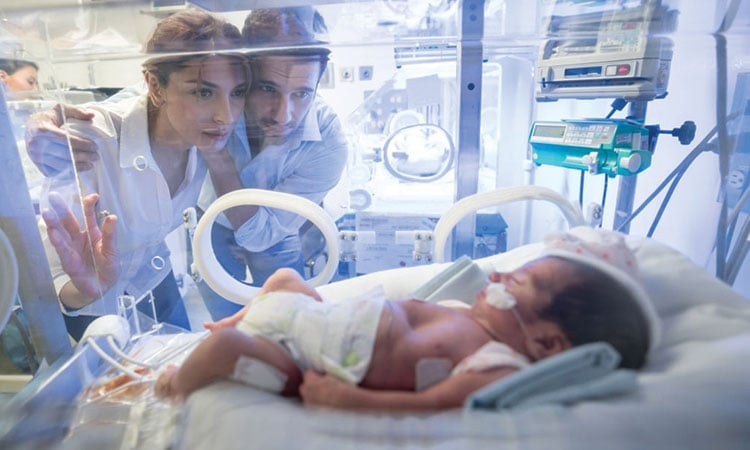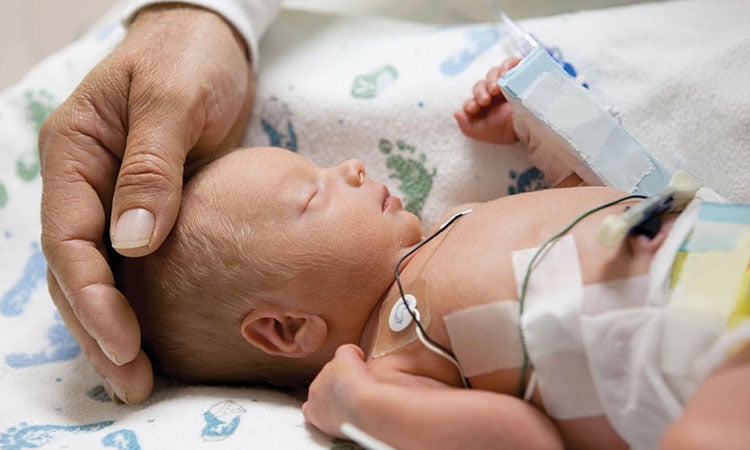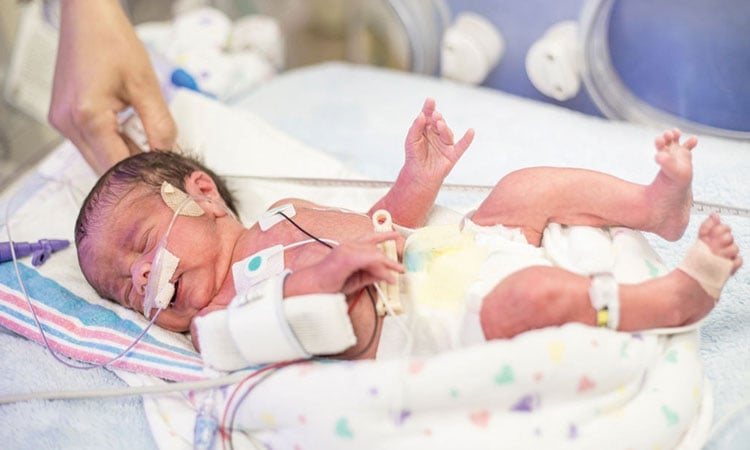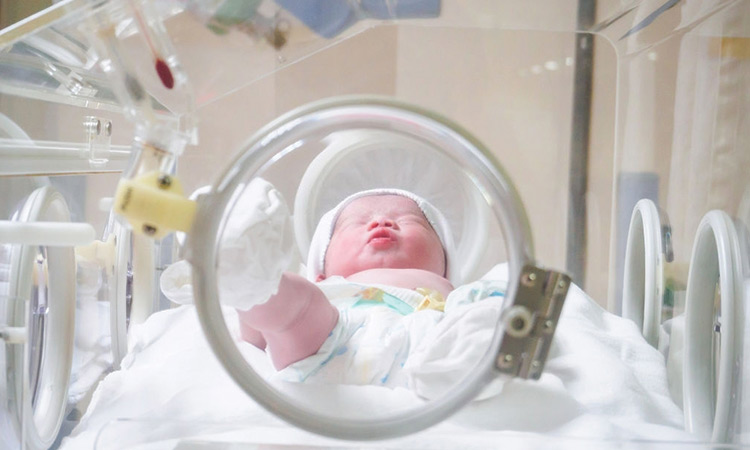Premature babies are babies born before they are physically and term-wise ready to leave the womb. Depending on when they are born, many health problems may affect premature babies. This is because when the babies are born premature, many of their organs will not be mature or ready to function outside the uterus.
Who Are Premature Babies?
The proposed due date of the baby is in the 40th week of gestation. Babies who are born before the 37th week of gestation are considered premature babies. It is further categorized as extremely preterm, very preterm, moderately preterm, and late preterm.
Babies born before the 28th week of gestation come under the classification of extreme preterm babies. If the baby is born between the 28th and 32nd weeks of gestation, they fall under the very preterm category. Preemies born within 32nd and 34th weeks of gestation are counted as moderately preterm, and those who are born 34th to 37th week are late preterm babies.
Late preterm babies carry fewer health issues than other preemies. For the reason that many organs are underdeveloped, premature babies may have difficulty breathing and feeding. They may also take more time to attain some developmental milestones.
They may also experience hearing and vision issues. Learning difficulties and subtle behavioral issues are some other common issues commonly found among preemies. Here, we will discuss the potential health problems that premature babies may to face.
Health Problems And Premature Babies-What You Should Know
The health problems of premature babies can be either short term or long term. It needs to be mentioned here that long term and permanent issues due to preterm birth are relatively low. Most of the health problems that may affect the premature babies will resolve as the baby’s organs develop.
The babies born earliest and small-sized preemies are more at risk of contracting severe and long term health problems. Premature babies are susceptible to health issues as many of the organs are not yet fully functional, and their immune system is underdeveloped. Let us see the important short and long-term effects of preterm birth.
Short-Term Complications of premature babies include breathing issues due to immature lungs, temperature control issues, and infections due to an underdeveloped immune system. It also includes metabolism disorder, gastrointestinal issues and blood issues like anemia, and underdeveloped organ issues like Jaundice caused due to immature liver.
Long-Term Complications of premature babies include long-term intellectual and developmental disabilities and issues with their lungs, brain, eyes, and other organs. Cerebral palsy, asthma, hearing loss, and dental issues are some of the long term complications of preemies. They are more prone to vision issues than term babies.
13 Health Problems That May Affect Premature Babies
Here are the top 13 health problems that may affect premature babies. We are categorizing it under the long term and short term issues, respectively.
Long term health problems that may affect premature babies

Premature babies are susceptible to various health issues. The earlier a baby is born, the more likely she is to have health problems and more severe the health problems will. Some of these health problems can pursue babies throughout their lives.
Some of these problems, like long-term intellectual and developmental disabilities, may not show up for several years. However, eventually, long term health issues like problems with learning, communicating, and health issues like asthma will appear.
Finding and treating these long term premature health problems promptly will help to face and deal with these issues with less difficulty. Here are some of the common long term health problems that may affect premature babies:
1. Cerebral palsy
Cerebral palsy is a group of conditions that affect movement and co-ordination. Babies with cerebral palsy will find difficulty with movement, postures, balance, and learning. Studies show preterm birth increases the chances of CP. Those born earliest being at the highest risk.
How to deal with it: This is a permanent condition. However, the severity of the symptoms of CP can be reduced by means of a range of therapies, including physiotherapy, speech therapy, and occupational therapy.
2. Asthma

Studies show that preterm birth is an important risk factor for the development of asthma in early childhood. It is found that approximately 1\4th of preemies with childhood asthma will get over it by the time they turn 18. This means the rest of the preemies advance to adulthood with asthma.
How to deal with asthma in premature babies: Asthma happens due to the inflammation of the airways. This brings about difficulty breathing. Newborn asthma can be effectively deal with by nebulizing the baby with a low dose of asthma medicines prescribed by the doctor.
As the baby grows, you can manage asthmatic attacks by daily medications, avoiding the triggers, using inhalers, etc.
3. Hearing problems in premature babies
Hearing development takes place during the last few weeks of pregnancy. Therefore, hearing issues like partial or complete hearing loss are one of the common long term health problems that may affect premature babies.
Hearing issues in preemies can be caused by underdeveloped inner ears, infections, etc. Depending on what caused the preterm birth, premature babies may be at risk for onset and delayed hearing loss.
Hearing problems can affect one or both ears. The risk is even high if the mother had infections like german measles, toxoplasmosis, etc.
Studies show that hearing loss is a severe consequence of prematurity. It is also found that high-risk babies are more prone to it. Premature babies are counted as high-risk babies.
How to deal with it: Treatment depends on the age, cause, and severity of the hearing loss in the baby. Treatments include hearing aids, surgery, cochlear implant, etc.
4. Retinopathy of prematurity (ROP)
This is a vision problem associated with premature babies. This condition develops due to the abnormal growth of blood vessels. ROP is most prevalent among babies with very low birth weight and premature babies born before the 31st week of pregnancy.
During the last trimester, the eye of the baby develops rapidly. The growth of retinal blood vessels that carries oxygen towards the retina develops towards the last few weeks of pregnancy.
When the baby is born prematurely, blood vessels may not have to get in touch with the edges of the retina. Therefore the periphery of the retina will not get enough oxygen or nutrients. This can lead to the development of ROP.
ROP can lead to retinal detachment, retinal scarring, etc., which can bring about severe vision problems and even blindness.
How to deal with: Invasive surgeries like laser therapy and cryotherapy are used to treat ROP in premature babies. However, more often, these surgeries can have long term side effects that compromise the vision.
Short term health problems that affect premature babies
Here are some of the short term health issues that affect preterm babies. Even though these issues don’t have any long term effect on the child, all these issues are very severe and call for immediate medical attention. If not detected and treated on time, many of these health issues can be fatal for the newborn.
5. Breathing problems in preemies

The lungs are one of the last organs to develop in babies before they are born. Also, some important components of the lungs will not develop until the closing stages of pregnancy. When the baby is born before term, their lungs will be immature. This leads to a number of breathing disorders.
Preemies can develop respiratory distress syndrome as the lungs fail to expand and contract normally. Likewise, if the baby is extremely premature, they are at higher risk of contracting Bronchopulmonary dysplasia.
Bronchopulmonary dysplasia happens due to the scarring of the lungs due to mechanical ventilators that are used to stabilize their breathing. Besides, some preterm babies may experience apnea- stopping breathing altogether for a short span.
6. Heart problems
The fetus’s heart differs from the baby’s heart in both structure and function. Once a baby is born and starts to breathe, it triggers the needed changes in the function of the heart. The preemies’ heart and lungs will be underdeveloped. This can cause several heart issues.
Patent ductus arterious (PDA) and low blood pressure (hypotension) are common heart issues experienced by premature babies. If left untreated, PDA can bring about several complications, including heart failure.
When the baby is in the womb, an opening called ductus arterious is present between two major blood vessels – the aorta and pulmonary artery. This vascular connection diverts blood from a baby’s lungs. When inside the womb, the baby receives oxygen from the mother’s circulation.
Ductus arterious usually closes shortly after birth. However, in preemies, this may not close. This directs the flow of poorly oxygenated blood in the wrong direction.
PDA might need surgical closure. Low blood pressure may require medicines to increase blood pressure, administrating extra fluid containing albumin, and if the low blood pressure is due to loss of blood, the doctor will order for blood transfusions.
7. Brain issues
Brain injuries are common in premature babies. One of the common issues is intra-ventricular hemorrhage (IVH) – bleeding in the brain. The earlier a baby is born, the risk of bleeding is high.
Most hemorrhages are negligible and get better without much complication. However, sometimes preemies may have heavy bleeding that can lead to permanent brain injury.
8. Temperature control problems
The body heat of premature babies tends to fall rapidly. This is because preemies don’t have enough body fat as full-term babies. Therefore, they fail to generate body heat to compensate for the heat lost through their body surface.
Extreme loss of body temperature can bring about a condition called hypothermia. Hypothermia in premature babies can bring about breathing issues and a significant fall in blood sugar levels.
To solve this issue, premature babies are placed in an incubator until they acquire enough body fat to maintain body temperature.
9. Gastrointestinal problems

More often, the gastrointestinal system of a premature baby will not be developed as a full-term baby. This can result in gastrointestinal complications such as necrotizing enterocolitis (NEC).
NEC is a condition that happens when tissue in the wall of the small or large intestine is injured or swollen. However, preemies, if given only breast milk, have a much lower risk of developing NEC. Treatment depends on the stage of NEC. In severe cases, surgical removal of the affected part may be required.
Gastroesophageal reflux (GER) is another condition contracted by premature babies. GER more often happens because lower esophagus muscles are still underdeveloped. This can be successfully treated by means of medications.
10. Blood problems
Premature babies are more prone to blood issues like newborn Jaundice and anemia. Even though a slight drop in red blood cells is common in newborns, this can fall significantly low in preemies.
Newborn Jaundice happens when the baby’s blood contains excess bilirubin, a yellow color secretion created by RBC. It’s the liver’s duty to eliminate bilirubin from the bloodstream.
Sometimes, a newborn’s liver may not be able to break bilirubin as soon as the RBC makes it. In that case, bilirubin accumulates in the blood, causing jaundice. Around 60% of the newborn contract jaundice.
Newborn Jaundice is a harmless condition, and more often, the babies will get better within a couple of weeks without any treatment. Newborn Jaundice is more common in preterm babies than in full-term babies.
11. Metabolism problems
Metabolic disorders are issues that hinder the breaking down of food, absorption of nutrients from the food, or handling enzymes. Premature babies are more prone to metabolism disorder.
Preemies are more prone to metabolic disorders like hypoglycemia (extremely low level of blood sugar), Galactosemia (accumulation of galactose in blood as the baby’s body fails to convert galactose (a milk sugar) into glucose (sugar in the blood).
When galactose accumulates in a baby’s system, it can damage the kidneys, brain, liver, and eyes. Therefore, preemies are usually screened for metabolic disorders. That is important for preventing serious health risks.
12. Immune system problems
Preemies are born with an immature immune system. As the immune system is not fully developed, preemies pose a higher risk of infection. They are prone to bacterial and viral infections like meningitis, pneumonia, etc.
13. Neonatal sepsis

The infection in premature babies should be treated promptly. Or else infection in premature babies can easily get into the bloodstream – causing a dangerous condition called sepsis that can potentially damage multiple organ systems.
Development in neonatal care and advanced treatment options for preterm babies has greatly reduced the death rate of premature babies. The chances for survival have increased significantly for even extreme preterm babies.

